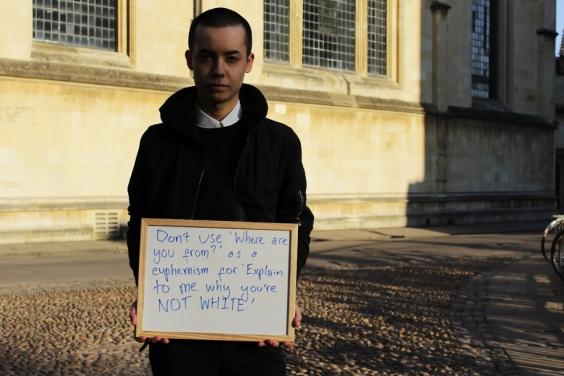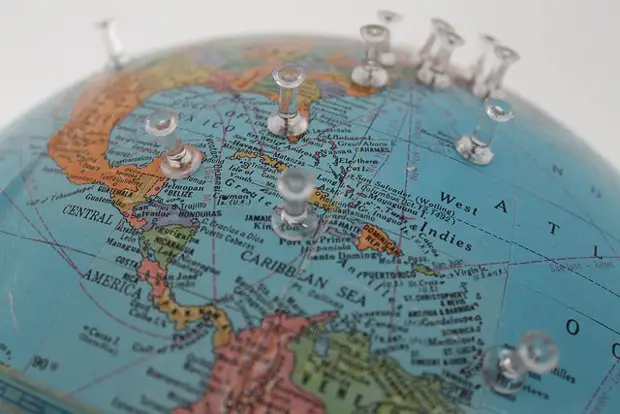While swiping on Tinder at home over winter break, I came across someone who had Superliked me named Brad. He wasn’t really my type, but I swiped right, because why not? Unless users have Tinder Plus, they only get one Superlike per day, so I took it as a compliment and thought I’d give him a chance.
Our conversation was pretty standard. He asked how I was doing, what I’d been up to over break and the awkward, “What are you looking for on Tinder?” I answered all of Brad’s questions, even the last one, and thought it might be fun to meet up, but then he asked, “So what ethnicity are you?” For people of color, questions like this on Tinder and in person are all too common. Sometimes complete strangers ask and other times they just assume: “Hey, what are you? You’re the perfect shade of brown,” or “Hola, mamacita, how are you?”

Questions like these are invasive, especially when starting a conversation with someone you’ve just met, and when confronted with the question out of the blue, it’s perfectly acceptable to say, “It’s kind of rude to ask about someone’s ethnicity,” just like I said to Brad, punctuated with a nervous laughter emoji.
But not answering the question or, rather, questioning the question, can get complicated. Be prepared for responses like, “I don’t think it’s rude. I’m German and Irish…that’s no secret.”
Be prepared to explain.
And then to explain a little bit more, because Brad might not understand: “I don’t get why you’re so upset. I’ve had Filipino, Columbian and Puerto Rican girlfriends before, and they’ve never been shy about what makes them them.” Is it too much to want someone like Brad to understand? No. The Brads of the world are not just college-aged white males. The people who ask, “Where are you from?” are of all ages and genders, and they all need to understand why the question they’re asking is so frustrating.
Some argue that hashing out microaggressions isn’t worth the time and effort, but the idea of reaching some kind of understanding is more attractive to me than dismissing someone as a hopeless bigot. Even if we didn’t meet up, I wanted to like Brad as a human being. But, that moment never came because, frankly, I got tired. Articulating why the ethnicity question is offensive can be difficult. Sometimes, it’s hard to find the right words, and the conversation isn’t a matter of finding “proof” to back up an argument. No website or study should be necessary to validate these feelings, because having been asked the ethnicity question multiple times is proof enough that both the phenomenon and the emotions you’re feeling do exist.
The question comes in many different forms. “Where are you from?” becomes: “No, but like, where are you really from?” “Where is your family from?” or “Where are your parents from?” Sometimes the question includes a compliment: “You’re so beautiful! Where are you from?”
Strategies to answering the ethnicity question vary. I used to respond with the long answer: “My dad’s parents are from Mexico, and my mom’s side of the family is from Spain, Germany, France and Italy.” After all, they asked, so give them the whole answer. But then, I decided that I wanted the exchange to be as short as possible, streamlining my response to: “My dad’s parents are from Mexico, and my mom’s side of the family is from Western Europe.” After all, the part about Western Europe was never what they were interested in.
People of color can answer the ethnicity question however they want, and they shouldn’t feel the need to convenience whoever asks. At one point, I would start off by listing the four European countries, making the listener wait for as long as possible for the part they wanted to hear: “…and my father’s parents are from Mexico,” at which point, more questions come: “Oh, do you speak Spanish?” “Did you grow up speaking Spanish at home?” “You’re fluent, right?” “Have you ever been to Mexico?”
These questions are irritating, because, though I’m proud of my Mexican heritage, I am an American, born and raised, and the Brads of the world need to understand that Mexican-American identity is not mutually exclusive with the American identity. Being Latin American, African American, Asian American or of mixed origins is not mutually exclusive with American identity. The United States is a diverse country, and though cities within the U.S. are more diverse than rural areas, anyone who’s taken a first grade history class should know that the first people in the U.S. were native people and immigrants and that, no matter how cheesy it sounds, U.S. culture is not homogenous, but a melting pot or a patchwork quilt, whichever metaphor is more accurate.

Being ambiguously brown is not a go-ahead to ask the ethnicity question. Appearing to be anything but what society perceives as white does not give anyone the right to ask about someone else’s ethnic background. The likelihood of someone asking Brad where he’s from is extremely unlikely, but if he were brown, maybe he’d get the same fun questions that people of color do: “Where are you from?”
“From the United States.”
“But where are you really from?”
Maybe Brad would learn to bluntly respond when people press further: “The U.S. is a diverse place; I’m 100 percent American.”
The short awkward silence that follows is all too satisfying.









